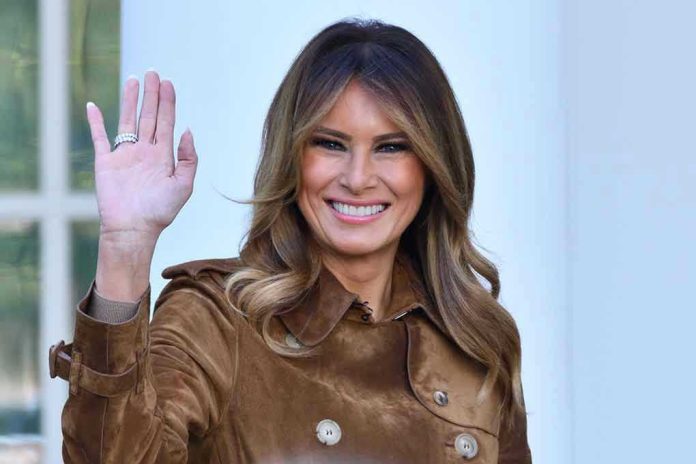
What if a rumor about Melania Trump secretly negotiating with Vladimir Putin to rescue kidnapped Ukrainian children could reshape how you view both international diplomacy and the machinery of modern misinformation?
Story Snapshot
- No credible evidence exists that Melania Trump has communicated with Vladimir Putin through back channels about Ukrainian children.
- The real crisis of Ukrainian children forcibly transferred to Russia is well-documented and ongoing.
- International organizations and official diplomatic channels—not private citizens—are responsible for legitimate repatriation efforts.
- This story’s structure mirrors common patterns of misinformation circulating in digital media.
Rumor Versus Reality: The Viral Melania Trump Story
Melania Trump’s name trended overnight, sparking fevered speculation that she had brokered a secret deal with Vladimir Putin to return kidnapped Ukrainian children. The claim, rapidly shared across platforms, suggested she navigated clandestine channels and secured the return of eight children to their families. Yet, not one established news outlet, government statement, or humanitarian agency has confirmed these details. Authorities, including the Ukrainian and U.S. governments, remain silent, and top fact-checkers flag the story as unverified or potentially fabricated. The machinery of rumor, it seems, sometimes runs ahead of fact.
While the tale is gripping, scrutiny reveals a void where evidence should be. The absence of credible sources and official confirmations raises red flags for anyone seeking truth in a sea of sensational headlines.
The Real Children’s Crisis: A Documented Tragedy
The plight of Ukrainian children forcibly deported to Russia is tragically real and recognized as a war crime by the International Criminal Court. Since 2022, over 19,000 children have been reported taken, with only a fraction returned through painstaking official negotiations. Legitimate returns have been facilitated by international organizations such as the Red Cross or mediated by states like Qatar, not through celebrity intervention or unofficial diplomatic channels. Each child’s return is a testament to months or years of bureaucratic navigation, international pressure, and relentless advocacy by families and governments.
These verified efforts stand in stark contrast to the viral narrative. While the idea of a high-profile figure orchestrating secret rescues is alluring, it diverts attention from the grim reality: most children remain separated from their families, and genuine progress comes from transparent, official efforts.
Why Disinformation Spreads—and Why It Matters
Stories like the Melania Trump rumor flourish because they blend hope, celebrity intrigue, and the urgent need for good news in a bleak humanitarian crisis. Misinformation thrives in the gaps between complex realities and the public’s hunger for heroes and simple solutions. Former diplomats and legal experts warn that if private citizens did undertake unauthorized negotiations with foreign powers, it could violate U.S. law and jeopardize ongoing official efforts. More importantly, such stories can undermine trust in legitimate humanitarian organizations and muddy the public’s understanding of what is truly at stake.
Disinformation is rarely random; its structure—a single, dramatic event, a famous name, and a lack of confirmable details—mirrors previous campaigns designed to distract, divide, or simply entertain. The danger lies in how these stories can distract from the real suffering of Ukrainian families and the painstaking diplomatic work required to reunite them.
The Real Stakeholders and the Ongoing Fight for Justice
The true actors in the Ukrainian children crisis are well-known: Ukrainian and Russian government officials, international courts, humanitarian organizations, and the families themselves. The International Criminal Court’s arrest warrants for Vladimir Putin and Maria Lvova-Belova highlight how seriously the world views the forced transfer of children as a war crime. Mediation by Qatar, documentation by the Ukrainian government, and advocacy by groups like UNICEF and Save the Children continue to drive incremental progress.
For the children and their families, the cost is incalculable—trauma, separation, and the risk of losing cultural and familial identity. The ongoing international response is slow, methodical, and rooted in law and humanitarian principle, rather than backroom deals and dramatic interventions.






